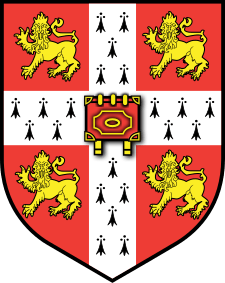Trinity Hall, Cambridge
Trinity Hall (formally The College or Hall of the Holy Trinity in the University of Cambridge) is a constituent college of the University of Cambridge. It is the fifth-oldest surviving college of the university, having been founded in 1350 by William Bateman, Bishop of Norwich, to train clergymen in Canon law following their decimation during the Black Death. Across its seven-century existence, Trinity Hall has been renowned for teaching law, but in recent decades, has come to teach the sciences, arts and humanities.
| Trinity Hall | ||||||||||||
|---|---|---|---|---|---|---|---|---|---|---|---|---|
| University of Cambridge | ||||||||||||
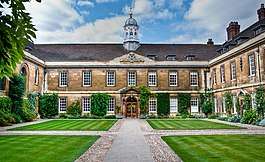 Trinity Hall's Front Court | ||||||||||||
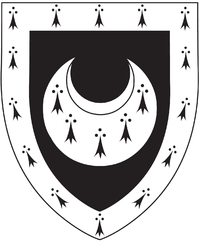 Arms of Trinity Hall Blazon: Sable, a crescent ermine a bordure (engrailed) of the last[1] | ||||||||||||
| Location | Trinity Lane (map) | |||||||||||
| Coordinates | 52.2057°N 0.1157°E | |||||||||||
| Full name | The College or Hall of the Holy Trinity in the University of Cambridge | |||||||||||
| Abbreviation | TH[2] | |||||||||||
| Founder | William Bateman, Bishop of Norwich | |||||||||||
| Established | 1350 | |||||||||||
| Named after | The Holy Trinity | |||||||||||
| Sister colleges | ||||||||||||
| Master | Jeremy Morris | |||||||||||
| Undergraduates | 382[lower-alpha 1] | |||||||||||
| Postgraduates | 230[lower-alpha 1] | |||||||||||
| Fellows | 65[lower-alpha 2] | |||||||||||
| Endowment | £66.7m[lower-alpha 2] | |||||||||||
| Website | www | |||||||||||
| JCR | www | |||||||||||
| MCR | www | |||||||||||
| Boat club | www | |||||||||||
| Map | ||||||||||||
 Location in Central Cambridge 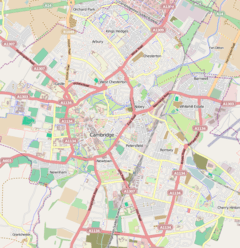 Location in Cambridge | ||||||||||||
As well as being known for its history and friendly atmosphere, Trinity Hall is renowned for its academic excellence. Since 2009, Trinity Hall has generally ranked in the top ten colleges on the Tompkins Table, and ranked in the top four in 2010, 2011, 2013 and 2014.
Perhaps uniquely, Trinity Hall has two sister colleges at the University of Oxford, namely All Souls and University College.
History
The devastation caused by the Black Death plague of the 1340s included the loss of nearly half of the English population; Bishop Bateman himself lost nearly 700 of his parish priests, and so his decision to found a college was probably centred on a need to rebuild the priesthood. The site that Bateman chose was the original site of Gonville Hall, which had been founded three years earlier, but was financially struggling. Bateman's clerical aim for the Hall is reflected in the foundation of 1350, when he stated that the college's aim was "the promotion of divine worship and of canon and civil science and direction of the commonwealth and especially of our church and diocese of Norwich." This led the college to be particularly strong in legal studies, a tradition that has continued over the centuries.[4]
At first all colleges in Cambridge were known as "Halls" or "Houses" and then later changed their names from "Hall" to "College". However, when Henry VIII founded Trinity College, Cambridge next door, it became clear that Trinity Hall would continue being known as a Hall. The new foundation's name may have been a punishment for the college's master, Stephen Gardiner, who had opposed the king's remarriage and had endured much of the college's land being removed. It is incorrect to call it Trinity Hall College, although Trinity Hall college (lower case) is, strictly speaking, accurate. A similar situation had existed once before when Henry VI founded King's College (in 1441) despite the existence of King's Hall (founded in 1317). King's Hall was later incorporated in the foundation of Trinity College in 1546.
Trinity Hall, in addition to having a chapel, also had joint usage of the Church of St John Zacharias with Clare Hall, until the church was demolished to enable the construction of King's in the 15th century. After this, the college was granted usage of the nearby Church of St Edward, King and Martyr on Peas Hill, a connection which remains to this day.
Recent Events
In 2015, ten students submitted formal complaints of verbal sexual harassment by Dr Peter Hutchinson. In response, Hutchinson was asked to withdraw permanently from further teaching and from attending social events at which students might be present.[5] However, in 2017, Hutchinson was invited to a college event, which was also open to students, in breach of this prior agreement.
Subsequently, in 2019, a formal agreement as to what events Dr Hutchinson could attend was approved by the Governing Body, although he remained an Emeritus Fellow. This resulted in further criticism: Dr Charlotte Proudman claimed that "the College has given fellows a licence to abuse their power with impunity. Women students are not safe in their own colleges.",[6] while The Guardian called it "a gross betrayal to the students" and "a dangerous environment for women students to study".[7]
In November 2019, Dr Hutchinson chose to resign as a result of the controversy,[8] while, in February 2020, the Master of Trinity Hall, Dr Jeremy Morris, "agreed to move aside while an investigation into procedures" was conducted.[9]
Buildings
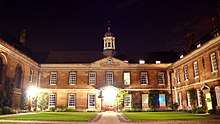
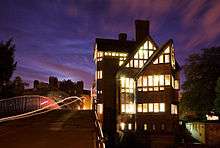
The college site on the River Cam was originally obtained from Bateman's purchase of a house from John de Crauden, Prior of Ely, to house the monks during their study, with Front Court being built within the college's first few decades.
The chapel was licensed in 1352 and was built by August 1366, when Pope Urban V granted the Master and Fellows permission to celebrate Mass in the college. In 1729-1730, Sir Nathaniel Lloyd, the then college master, redecorated the chapel in what, despite subsequent enlargements, remains an intimate style, forming the smallest of the University's chapels. Lloyd removed some of the more prominent graves to the ante-chapel, while digging a vault for his own burial, and decorated the interior walls with wainscoting and the ceiling with stucco representations of past masters' crests. The chapel was extended to the east by a few feet in 1864, during which the medieval piscina was rediscovered and rendered accessible by a small door in the wainscoting. The current chapel painting is Maso da San Friano's Salutation, depicting Mary's visit to Elizabeth, from the opening of the Gospel of Luke, which replaced an earlier painting by Giacomo Stella in 1957.
Like the chapel, the college's dining hall was rebuilt by Sir Nathaniel Lloyd along similar lines, with the panelling replaced throughout and the medieval beams replaced by fine baroque carvings. Although the hall was enlarged in the 19th century, it is still one of the smallest and most intimate dining halls in the University.
The college library was built in the late 16th century, with the permission of Elizabeth I and probably during the mastership of Thomas Preston, and is now principally used for the storage of the college's manuscripts and rare books; it is one of the few remaining chained libraries left in the country. The new Jerwood Library overlooking the river was opened by Lord Howe in 1999, and stores the college's modern book collection.
The college also owns properties in the centre of Cambridge, on Bateman Street and Thompson's Lane, and on its Wychfield site next to Fitzwilliam College, where most of the college's sporting activity takes place.
Student Life
Combination Rooms
Trinity Hall has active Junior, Middle and Senior Combination Rooms for undergraduate, postgraduate and senior members of the college community respectively. The Middle Combination Room is located in Front Court, while the Junior Combination Room is adjacent to the college bar in North Court. Both the MCR and JCR have highly active committees and organize popular socials for their members across the term.
Trinity Hall Boat Club
Trinity Hall's oldest and largest society, the Boat Club was founded in 1827, and has had a long and distinguished history; notably from 1890 until 1898, when the college stayed Head of the Mays for 33 consecutive days of rowing, which remains to this day the longest continuous defence by a single club of the bumps headship. The college won all but one of the events in the 1887 Henley Royal Regatta, making it the most successful Cambridge college in Henley's history. The current boathouse, built in 1905 in memory of Henry Latham, is on the River Cam, a short walk from the college.
Gallery
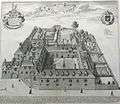 Trinity Hall in 1690
Trinity Hall in 1690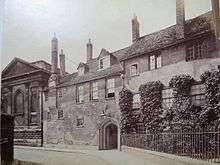 The original entrance
The original entrance The demolition of the original entrance
The demolition of the original entrance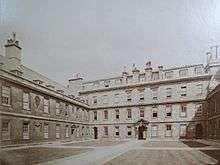 Front Court
Front Court Armorial Detail in Front Court
Armorial Detail in Front Court The Master's Garden
The Master's Garden South Court
South Court The Elizabethan Library
The Elizabethan Library- The Elizabethan Library
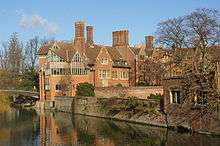 The Jerwood Library
The Jerwood Library Wychfield Site
Wychfield Site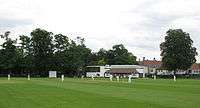 College cricket ground
College cricket ground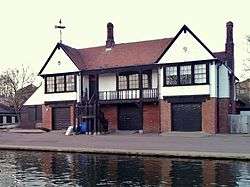
People associated with Trinity Hall
Masters
The current Master is the Revd Dr Jeremy Morris.[10] He took up the role on 1 October 2014 after Martin Daunton stepped down after ten years in post.[11]
Deans
The current Dean is the Revd Dr Stephen Plant. The role of Dean incorporates that of Chaplain in other colleges.
Fellows
Notable alumni
%2C_by_Daniel_Mytens.jpg)
.png)
.jpg) J. B. Priestley, novelist, playwright and broadcaster
J. B. Priestley, novelist, playwright and broadcaster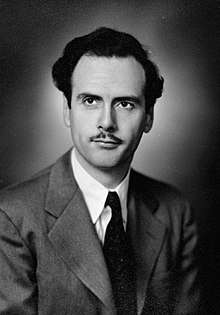 Marshall McLuhan, Canadian philosopher
Marshall McLuhan, Canadian philosopher.jpg)
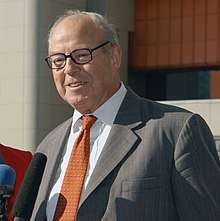 Hans Blix, Swedish Minister for Foreign Affairs
Hans Blix, Swedish Minister for Foreign Affairs.jpg)


_09.jpg) Andrew Marr, journalist and broadcaster
Andrew Marr, journalist and broadcaster Rachel Weisz, Oscar-winning actress
Rachel Weisz, Oscar-winning actress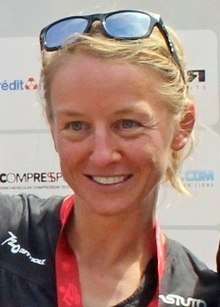 Emma Pooley, Olympic silver-medallist cyclist and presenter
Emma Pooley, Olympic silver-medallist cyclist and presenter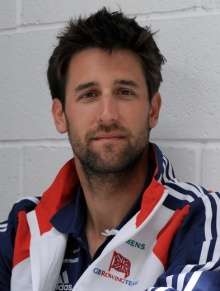
- Zafar Ansari – Surrey and England cricketer
- Thomas Bilney – Protestant reformer and martyr
- Hans Blix – Former UN Chief Weapons Inspector
- Stanley Bruce – Prime Minister of Australia, 1923–29
- Richard Boyle – Rower. Bronze medal in 1908 Olympics
- Edward Carpenter – Socialist poet and homosexual activist
- John Cockett – Hockey player. Bronze medal in 1952 Olympics
- William Cooke – Hymn writer
- Archibald Craig – Fencer. Competed in the 1924 and 1948 Olympics
- Don Cupitt – Philosopher of Religion and scholar of Christian theology
- Sir Charles Dilke – Victorian politician
- Laurence Doherty – Tennis player, Olympic gold medalist and Wimbledon Champion
- Reginald Doherty – Tennis player, Olympic gold medalist and Wimbledon Champion
- Lionel Elvin – educationist
- Ronald Firbank – novelist
- Billy Fiske – bobsleigh Olympian and first American fatality of WWII
- Norman Fowler – Politician
- Aubrey de Grey – Anti-ageing theorist
- Frances Harrison – journalist
- Stephen Hawking – Physicist
- Arthur Henderson, Baron Rowley - Labour politician; Secretary of State for Air, 1947-51.
- Robert Herrick – poet
- Matthew Holness – Perrier Comedy Award-winning creator of Garth Marenghi
- Andy Hopper – Computer scientist
- Charles Howard, 1st Earl of Nottingham - admiral
- Geoffrey Howe – Former MP and Chancellor of the Exchequer
- Nicholas Hytner – Theatre and film director
- Magnus Linklater – Journalist
- Tom James – Rower, double Olympian and Olympic Gold medallist
- Greville Janner – Former Labour MP and Peer
- David Johnston – The Governor General of Canada
- Harold Kitching – Rower. Bronze medal in 1908 Olympics
- Donald Maclean – Soviet spy
- Andrew Marr – Political journalist and broadcaster
- Adam Mars-Jones – British novelist and critic
- Brett Mason - Australian Senator
- Alfred Maudslay – Archaeologist, explorer, and diplomat
- Alan Nunn May – Physicist and Soviet spy
- Reginald McKenna – Chancellor of the Exchequer during World War I
- Marshall McLuhan – Media theorist
- Sir John Meyrick – Rower. Silver medal in 1948 Olympics
- Peter Millett, Baron Millett – Law Lord
- John Monckton, 1st Viscount Galway – politician
- Khwaja Nazimuddin – Pakistan's second Prime Minister
- Donald Nicholls, Baron Nicholls of Birkenhead – Law Lord
- David Oliver - Geriatrician, President of the British Geriatrics Society
- Tony Palmer – Film screenwriter and director
- Michael Peppiatt – Art historian
- Baron von Pfetten - Professor, Ambassador and Senator
- Emma Pooley – Olympic silver medalist
- Alistair Potts – British World Champion coxswain
- J.B. Priestley – Writer
- William Barnard Rhodes-Moorhouse – First airman to be awarded the Victoria Cross
- Abigail Rokison – Shakespeare academic
- David Sheppard – Bishop and cricketer
- John Silkin – Former Government minister
- Samuel Silkin, Baron Silkin of Dulwich, of North Leigh in the County of Oxfordshire – former MP and Attorney-General
- William Smith – Hockey player. Gold medal in 1920 Olympics
- Tony Slattery – Perrier Comedy Award-winning comedian
- Douglas Stuart – Rower. Bronze medal in 1908 Olympics
- Leslie Stephen – Victorian writer and critic
- Galen Strawson - Philosopher
- Sidney Earnest Swann – Rower, gold medalist in 1912 Olympics
- Sir Cyril Taylor - Businessman and social entrepreneur
- John Taylor – Hockey player. Bronze medal in 1952 Olympics
- John Thomas, Baron Thomas of Cwmgiedd - Lord Chief Justice of England and Wales
- David J. Thouless, theoretical physicist, Nobel Prize and Wolf Prize winner
- Nicholas Tomalin – Journalist and reporter
- Mark Tully – BBC radio broadcaster
- Edmund de Waal – Ceramic artist and author
- Terry Waite – Fellow Commoner of Trinity Hall
- Rachel Weisz – Academy Award-winning actress
- Sophie Winkleman – Actress
- John Wodehouse, 3rd Earl of Kimberley – Polo player, Olympics gold medalist
See also
References
- Arms of Trinity Hall, Cambridge, being the arms of Bateman, as used by William Bateman (d.1355), Bishop of Norwich 1344-55, founder of Trinity Hall: as seen (with bordure engrailed) at Trinity Hall, Cambridge (over B staircase), impaled by the arms of the See of Norwich.
- University of Cambridge (6 March 2019). "Notice by the Editor". Cambridge University Reporter. 149 (Special No 5): 1. Retrieved 20 March 2019.
- Trinity Hall, Cambridge. "Accounts for the Year Ended 30 June 2018" (PDF). Retrieved 26 April 2019.
- "Trinity Hall -". cam.ac.uk.
- "Statement of clarification". Trinity Hall. 24 October 2019.
- "Cambridge harassment row fuels calls to reform college system". The Guardian. 24 October 2019.
- "Cambridge isn't the only university to fail at handling sexual misconduct complaints". The Guardian. 24 October 2019.
- "Cambridge University academic resigns after Trinity Hall row". BBC. 6 November 2019.
- Croxford, Rianna (22 February 2020). "Trinity Hall: Cambridge college head 'steps back' over handling of sex complaints". BBC News Online. Retrieved 22 February 2020.
- "Trinity Hall - Master". Trinity Hall Cambridge. Retrieved 18 April 2014.
- Martin Daunton Archived 2004-12-06 at the Wayback Machine
Bibliography
- The Hidden Hall: Portrait of a Cambridge College, Peter Pagnamenta, ISBN 1-903942-31-4
- Trinity Hall: The History of a Cambridge College, 1350-1975, Charles Crawley, ISBN 0-9505122-0-6
- Warren's Book (Ed. 1911 by A.W.W.Dale)
- Trinity Hall or, The college of scholars of the Holy Trinity of Norwich, in the University of Cambridge, Henry Elliot Malden. (1902). London: F.E. Robinson.
External links
| Wikimedia Commons has media related to Trinity Hall, Cambridge. |
